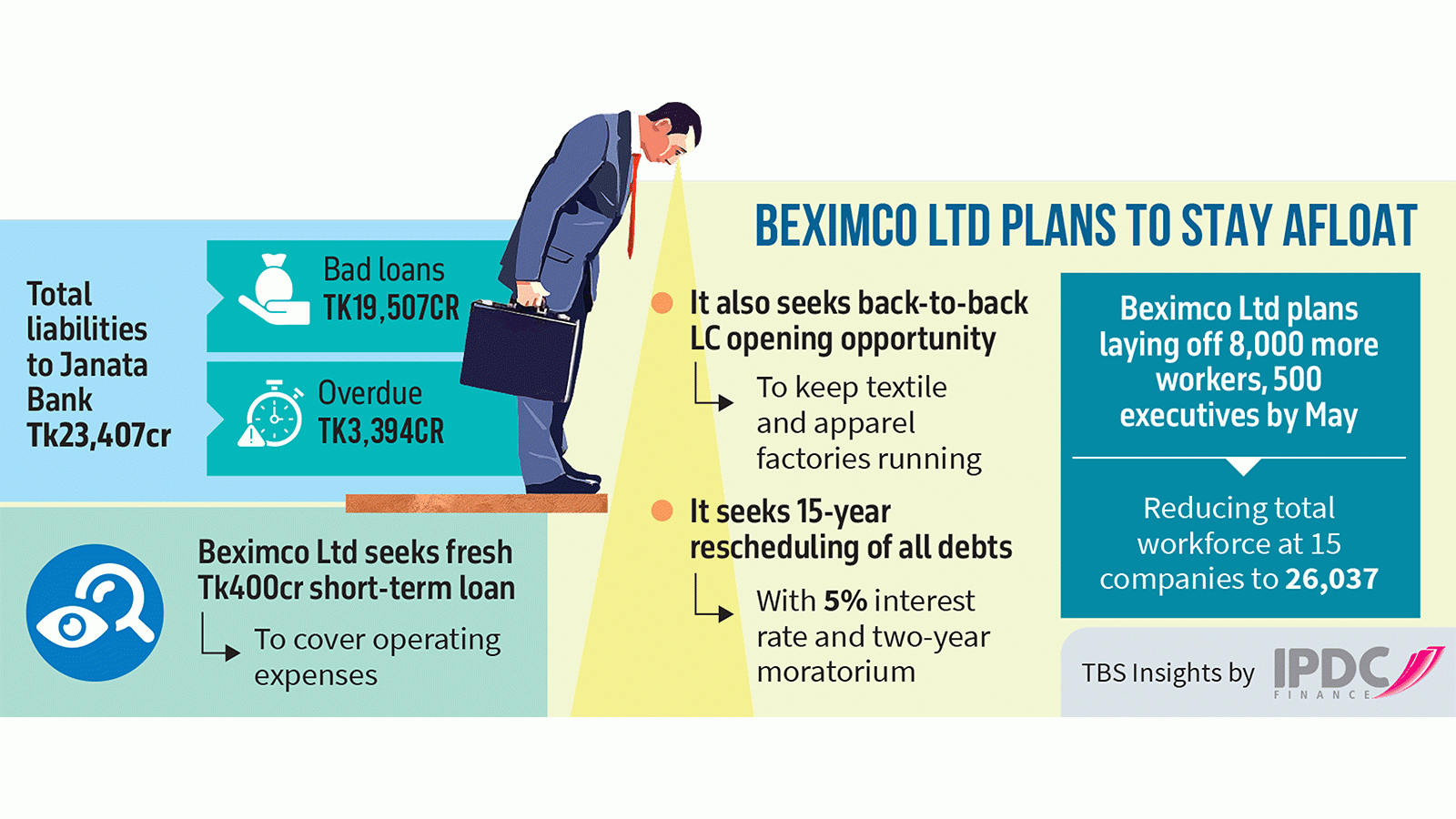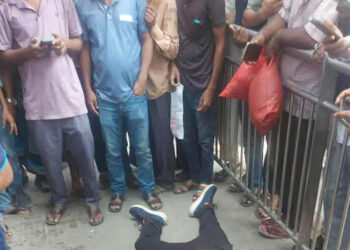Infographic: TBS
Officials and employees of Beximco Limited urge that factories be reopened, but the labor consultant says “no.” Beximco asked Jamuna Bank for Tk 400 crore. Banks were encouraged by Beximco to reschedule the loans for a period of 15 years. By 2025, the corporation hopes to turn a profit. Beximco Limited has asked state-owned Janata Bank for Tk400 crore in cash credit (CC), or short-term financing, to pay operational costs. The company also wants to create back-to-back letters of credit to maintain operations at its 15 struggling textile and garment factories.
Furthermore, it has asked for a 15-year repricing of all debts accrued up until December 2024 at a 5% interest rate with a two-year moratorium, promising to pay back obligations over time by maintaining exports and jobs. Similar demands were made yesterday by employees and executives of Beximco Limited, who called for the immediate reopening of all factories controlled by Salman F. Rahman, a former adviser to deposed Prime Minister Sheikh Hasina, as well as the cessation of layoffs.
However, Brig Gen (retd) M Sakhawat Hussain, the Labour Adviser, stated that it was not feasible to restart the plants that Beximco Limited had shut down. “These factories have accumulated so much debt that they have lost their operational viability,” he stated during a press conference held at the Secretariat yesterday after the “Advisory Council Committee on Reviewing the Labor and Business Situation of Industrial Enterprises in Beximco Industrial Park” met.
Reduce expenses and increase earnings
On January 16, Beximco Textiles submitted a proposal to the chairman and managing director of Janata Bank outlining a strategy to boost earnings for 2025 and 2026 through cost reduction and careful observation of businesses focused on exports.
“In 2025, we anticipate a cash surplus of about Tk30 crore. This is because, in comparison to the required expenditures for the same period, revenue and sales in the first half of the fiscal year were extremely low. Additionally, the letter signed by Osman Kaiser Chowdhury, managing director of Beximco Limited, states that “the implementation of this business plan in the first year will require the retrenchment of 8,000 workers and 500 management staff, in addition to those already laid off, which has been factored into the P&L and CF.”
However, if we consider profitability from the most recent quarter, we may anticipate a monthly cash surplus of about Tk40 crore. We have no doubt that by 2026, we will be able to utilize the factory almost to its maximum capacity. In 2026, we anticipate a profit of Tk536 crore if we produce at optimal size. Exports from Beximco Limited were Tk6,111 crore in 2020, Tk3,766 crore in 2023, and Tk3,052 crore in 2024, according to statistics from Janata Bank. In November of last year, the finance ministry received a letter from Janata Bank stating that Beximco owed the state-owned lender Tk23,407 crore, of which Tk19,507 crore were classified as bad loans and Tk3,394 crore as past due.
Only three of the fifteen manufacturing businesses that make up the Beximco Textiles and PPE Division—Beximco Limited, Beximco PPE Limited, and RR Washing Limited—are now in operation. On December 16, the remaining 12 firms were laid off after a decision by the interim government’s Advisory Council Committee. Now, the fired employees are demonstrating for the factories to reopen.
Following the Awami League administration’s overthrow on August 5, Janata Bank authorized three months’ worth of employee salaries, with the government deducting one month’s worth from the budget. As a result of the difficulty to open consecutive LCs, export-oriented enterprises have ceased operations.
In July, Beximco Textiles employed 44,649 people, 42,699 of them were workers, prior to the fall of the Hasina administration. 9,778 employees are among the 10,112 persons who have been laid off since then. The Beximco Group plans to lay off a further 8,000 employees and 500 executives by May, bringing the total number of employees at Beximco Textiles down to 26,037.
“We can say that our business plan is very realistic and achievable,” stated Osman Kaiser Chowdhury. Looking at our export performance over the past five years, we have averaged $32 million every month. Additionally, in 2022, the average monthly export was $59 million.
Beximco Textiles stated that their business estimates may be sensitive to certain factors. Among all these issues, sales, cost of sales, international market prices, energy supply, and political stability are of particular importance. If sales drop by 5%, profit decreases by 9%. If they can save 1% on material costs, it will improve profitability by 10%. Moreover, devaluation of the taka against the US dollar will positively impact profit, as Beximco stated, “If we follow a normal standard, our profit may vary from 5% to 10%.”
Beximco told Janata Bank that to achieve this business potential, it is crucial to restart the institution quickly to ensure the livelihoods of the people associated with it, secure foreign exchange earnings, and restore the debt collection system of the debt-paying institutions. Every day’s delay will push the possibility of success further away.
“If the banking facility is not provided as per our proposal, there is no other option but to close the businesses,” Beximco added. If only the back-to-back LC facility is provided by banks, Beximco will be unable to accept direct purchase orders or perform export operations with foreign buyers. It will only be possible to work on a commission basis. Beximco has analysed the feasibility of running factories based on commission work only. In this case, the annual income will fall to Tk550 crore, and only 6,000 workers and 300 management staff will remain employed after related expenses are covered.
Closing down the remaining factories will cause real damage to all the factories and installed machinery. Additionally, Beximco will have to lay off the remaining 27,000 workers and 1,300 officers, which will require Tk450 crore for their final settlement. If no facility is provided by the bank, all the industrial units will become ineffective due to inactivity. Furthermore, the entire workforce of 34,500 workers will become unemployed, and liabilities will amount to a total of Tk24,213 crore – Tk559 crore for employee liabilities, Tk368 crore for creditors, and Tk23,285 crore for bank loans.
No export orders since August
According to Osman Kaiser, enterprises had no work or exports in the months after August, yet they were still required to pay Tk80–120 crore in salary to their employees each month. Since then, Beximco has paid Tk300 crore out of its own cash, while Janata Bank and the government have contributed Tk250 crore in employee pay. However, the manufacturers have not profited from these payments since they have not received the back-to-back LC facility required for commercial activities,” he continued.
“On behalf of the company’s officers and employees, we agree that any financial irregularities should be prosecuted under the law,” he added in reference to the accusations of money laundering against Beximco. We merely ask that a large state resource not be squandered because of the actions of one person.
Errors have occurred
He stated, “We must have made some mistakes or irregularities,” in reference to the unfavorable public opinion of Beximco Group. Young people with education in the 1980s and 1990s saw working at Beximco as an honor. Even though we spearheaded the nation’s private sector’s growth, we are currently dealing with a negative and demeaning result. This is the outcome of our own shortcomings.However, there is a chance to reevaluate the unfavorable opinion if we take into account the employment, foreign exchange profits, factory infrastructure, and contribution to national output.
Comments from a Labour advisor
Adviser Sakhawat emphasized Beximco’s debt situation, the activities of its workers, and the government’s stance, saying: “On January 21, workers and employees of Beximco Industrial Park rallied in Sreepur Mayanagar in Gazipur, demanding the reopening of factories and the removal of layoffs.
In the event that the factories were not reopened by 3 p.m. on January 22, they threatened to close and barricade the Dhaka-Tangail Highway. But their behavior—like starting fires—is intolerable and will result in consequences. The advisor revealed that 16 of the 32 enterprises in the Beximco Industrial Park are no longer in operation but were pledged as security for loans totaling Tk12,000 crore.
Three factories are still in business, but twelve have laid off workers—a decision that was not taken by the government. Additionally, Sakhawat disclosed that Beximco Limited has more than Tk40,000 crore in bank debt, of which Tk29,925 crore is secured by the 32 enterprises located in Beximco Industrial Park.
Employee demands of Beximco Ltd.
Beximco workers, employees, and officials urged yesterday at a press conference at the Capital Market Journalists’ Forum that banking services be restored and that they be allowed to establish back-to-back LCs in order to ease export commerce and receive international job orders.
In order to maintain factory operations and pay back unpaid salaries and corporate debts, they also demanded prompt action. Three requests were outlined in a written declaration read aloud by Syed Md Enam Ullah, head of Personnel and Administration of the Beximco Garments Division.
An internal analysis of Beximco Industrial Park showed that selling all of its businesses would bring in Tk15,500 crore, but that Tk22,000 crore would be needed to settle debts through layoffs and other obligations, according to Abdul Kaium, chief of administration for the Beximco Garments Division.
“What the owners have done with the loans is unknown to us. To open LCs and allow the factories to function, permission needs be given. Export revenue can be used to cover costs and employee wages. “The factories must be reopened, but if it’s necessary, let the banks keep the profits,” he said.
“We have over 5,000 senior citizens, 2,000 people with disabilities, and people of the third gender among us,” a labor representative stated. These disadvantaged populations will be forced into terrible circumstances if these factories are closed.
Source: The Business Standard
Share via:



















